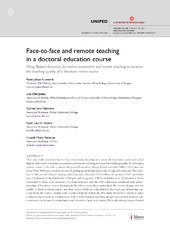| dc.contributor.author | Krumsvik, Rune Johan | |
| dc.contributor.author | Jones, Lise Øen | |
| dc.contributor.author | Leer-Salvesen, Kjartan | |
| dc.contributor.author | Høydal, Kjetil L | |
| dc.contributor.author | Røkenes, Fredrik Mørk | |
| dc.date.accessioned | 2019-12-10T14:24:07Z | |
| dc.date.available | 2019-12-10T14:24:07Z | |
| dc.date.issued | 2019 | |
| dc.Published | Krumsvik R, Jones LØ, Leer-Salvesen K, Høydal K, Røkenes FM. Face-to-face and remote teaching in a doctoral education course: Using Flipped classroom, formative assessment and remote teaching to increase the teaching quality of a literature review course. UNIPED. 2019;42(2):194-214 | eng |
| dc.identifier.issn | 1893-8981 | |
| dc.identifier.uri | https://hdl.handle.net/1956/21070 | |
| dc.description.abstract | This case study examines face-to-face and remote teaching in a doctoral education course and ask if flipped classroom, formative assessment and remote teaching increase the teaching quality of a literature review course. To be able to answer the research question, design-based research (DBRC, 2003) and case study (Yin, 2009) were used as a research-pedagogical design and methodological framework. The selection of informants is based on purposeful selection (Maxwell, 2005) where one group of PhD candidates (n = 24) situated at the University of Bergen and one group of PhD candidates (n = 12) situated at Volda University College, were selected. The study indicates that the PhD candidates enhanced their understanding of literature review throughout the PhD course, they appreciated the course design, and the quality of their academic papers and their survey feedback indicated that they had a good learning outcome from the course. Despite some methodological limitations, this study shows that advanced video conferencing systems in combination with a well-prepared teaching design have several positive outcomes and can be used as a starting point for a more large-scale study. The study shows, despite former mixed experiences with remote teaching, that student participation via several campuses did not necessarily lead to poorer quality and poorer learning outcome for these PhD candidates in this case study. However, the case study also shows the need for more large-scale research which will give a more nuanced and thorough understanding of how we can increase the teaching quality of remote teaching as part of the training component in the PhD. | en_US |
| dc.language.iso | eng | eng |
| dc.publisher | Universitetsforlaget | eng |
| dc.rights | Attribution CC BY | eng |
| dc.rights.uri | http://creativecommons.org/licenses/by/4.0/ | eng |
| dc.subject | doctoral education | eng |
| dc.subject | literature review | eng |
| dc.subject | remote teaching | eng |
| dc.subject | flipped classroom | eng |
| dc.subject | formative assessment | eng |
| dc.subject | training component | eng |
| dc.title | Face-to-face and remote teaching in a doctoral education course: Using flipped classroom, formative assessment and remote teaching to increase the teaching quality of a literature review course | eng |
| dc.type | Peer reviewed | |
| dc.type | Journal article | |
| dc.date.updated | 2019-08-30T08:33:05Z | |
| dc.description.version | publishedVersion | |
| dc.rights.holder | Copyright 2019 The Authors | eng |
| dc.identifier.cristin | 1581978 | |
| dc.source.journal | UNIPED | |

